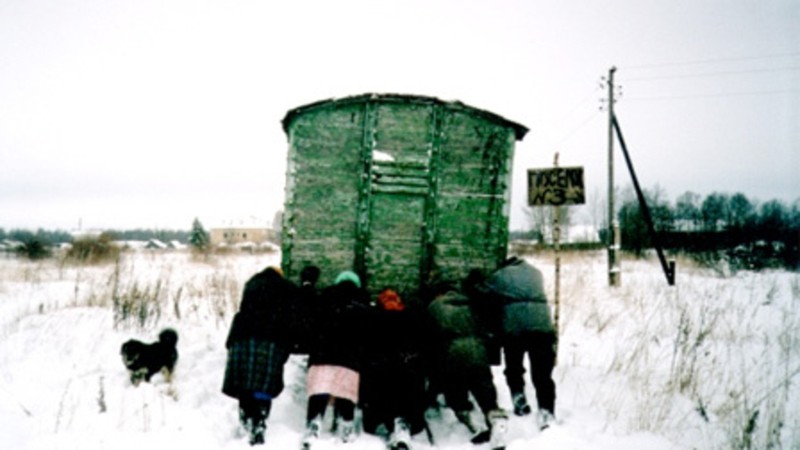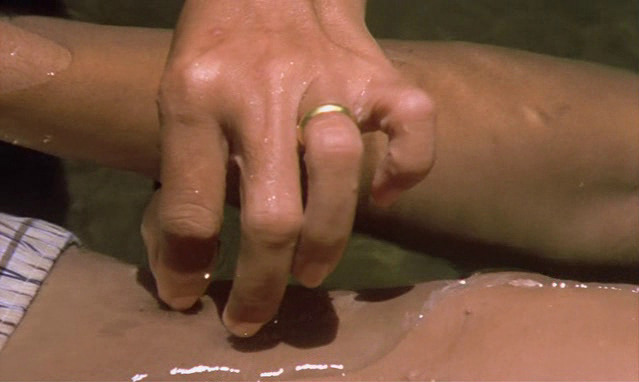Gina [Stone Cold Revenge] (Denys Arcand, 1975)
Dec
11
1952

Gina (Céline Lomez) stripping in front of a silver tinsel curtain. The silhouette of a woman is visible in the foreground. DP: Alain Dostie.
SlowCinema
Na wylot [Through and Through] (Grzegorz Królikiewicz, 1972)
Nov
4
1933

Maria (Anna Nieborowska) and Jan (Franciszek Trzeciak) in court. The film is based on the 1933 Jan and Maria Malisz’s Case. DP: Bogdan Dziworski.
“That's all the people we've got now. We'll get there somehow.” Хлебный день [Khlebnyy den / Bread Day] (Sergei Dvortsevoy, 1998)
Aug
10
green

The old folks pushing the cart past the hamlet's name sign. With thick brush strokes, almost too much for the small rectangle, it reads TOWNSHIP NR. 3. DP: Alisher Khamidkhodzhaev.
Green: a building or structure*
Where the old folks' hands push the cart, the green's worn off. That doesn't change anything about its importance. A lifeline, bread, is delivered once a week and with delivered, it means that the carriage is left on the rails, several kilometers away from Zhikharevo, or Township Nr. 3, which in its turn is about 80 km away from Saint Petersburg. It takes the seniors about two hours to get the wagon to their hamlet. We get to witness ten minutes or so. It lasts a lifetime.
As of 2002, only three people lived in Zhikharevo. I wonder how the wain comes home now.
* the Bales 2025 Film Challenge for August is not date-related but lists, for the most part, the colours of the rainbow.
“I treasure some kinds of old Thai disaster movies. Many of such tell a forbidden love story between a man and a woman that the mother earth destroyed them. Similarly, Blissfully Yours contains innocent narrative and simple characters. The settings are open landscapes and the disaster plot is there, except that it is transformed into another kind of disaster.” สุดเสน่หา [Sud sanaeha / Blissfully Yours] (Apichatpong Weerasethakul, 2002)
Jul
17

A hand picking skin in the water (via). DP: Sayombhu Mukdeeprom.
Someone with sunburn, or a skin condition*
– A.W., via
Min and Roong cherish their love among the uncertainty of his residence status. A old woman guards them, and soothes Min's blistered skin.
* the Bales 2025 Film Challenge for July is, for unknown reasons, mostly not date-related and follows some sort of vacation narrative.
“Dear child,
l received your letter and hope you will write often. l hope you won’t stay away too long and that you’ve found a job by now. If you’re doing well, we’re happy. Even though we do miss you. When will you be back? Everything is fine here, but Sylviane is home with the flu. My blood pressure is low. l’m on medication for it. Today is my birthday. l feel sad. lt’s quiet at the shop. Tonight we’re going out to dinner with friends. That’s all. Your birthday is coming up. l wish you all the best. Write to me soon about your work, about New York, about everything. Lots of love from the three of us.News from Home (Chantal Akerman, 1976)
Apr
3
Pony Express Day

New York, a street scene. Superimposed a quote from one Chantal Akerman's mother's letters. DPs: Jim Asbell & Babette Mangolte.
Mail or a mail carrier for Pony Express Day (USA).
Your loving mother” (quote via)
Chantal Akerman reads out letters that her mother wrote to the former's stay in New York City between 1971 and 1973. The words slowly blend with the city.
行者 [Jingang Jing / Walker] (Tsai Ming-liang, 2012)
Dec
8
बोधि

The monk (Kang-sheng Lee) walking Hong Kong. DP: Tsai Ming-liang.
Gina [Stone Cold Revenge] (Denys Arcand, 1975)
Dec
5
فَاطِمَة بِنْت مُحَمَّد

Gina (Céline Lomez) waiting at an airport. DP: Alain Dostie.
A triumphant woman in commemoration of the martyrdom of Sayyida Fatimah al-Zahra
The Animal (Walter Ungerer, 1976)
Sep
22

A man (Paul Ickovic) by himself at a table. The table setting suggests another person present. DP: Walter Ungerer.
Na wylot [Through and Through] (Grzegorz Królikiewicz, 1972)
Jul
15
sandwiches

Jan (Franciszek Trzeciak) and Maria (Anna Nieborowska) share lunch on a bench. DP: Bogdan Dziworski.
– Ah, regarde, c'est Tati !
– Tati qui?
– Tati, comme Mon Oncle.Simone Barbès ou la vertu (Marie-Claude Treilhou, 1980)
Jun
19
pâté

Two female porn theatre ushers (Ingrid Bourgoin and Martine Simonet) looking bored. They sit under two large eye-shaped neon lights. Between them a small table with various half-consumed items, including part of a baguette with pâté. DP: Jean-Yves Escoffier.